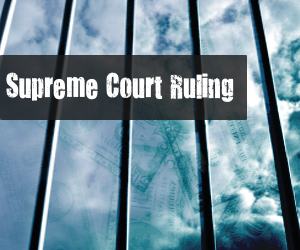
Child Support Case Study: Jailing Dads Who Can’t Pay
 One of the more visible issues challenging father’s rights is that most men who are behind on child support are not unwilling to pay; they are unable to pay. And yet courts across the country continue to jail fathers for their inability to pay.
One of the more visible issues challenging father’s rights is that most men who are behind on child support are not unwilling to pay; they are unable to pay. And yet courts across the country continue to jail fathers for their inability to pay.
The article “Child Support: The ‘Deadbeat Dad’ Predicament” examined the issue of jailing “deadbeat dads,” but this article looks at a recent U.S. Supreme Court ruling that addressed a landmark child support case.
In Turner v. Rogers, the South Carolina family court ordered petitioner Michael Turner to pay $51.73 a week to respondent Rogers. Mr. Turner, unemployed and financially strapped, was held in contempt of court five times for failure to pay. He was sentenced to 90 days in jail for the first four failures to pay. He ultimately paid what he owed.
For the fifth offense, Mr. Turner was sentenced to 6 months in the County Jail. He completed this, but was brought back to court again for support arrearages in the amount of $5,728.76. Neither party was afforded an attorney. The judge found Turner to be in willful contempt and sentenced him to 12 months in State Prison, but made no finding on Mr. Turner’s ability to pay.
Mr. Turner could have actually been released earlier by paying the nearly $6,000 he owed, but he was unable because he had no money and no job, which was no small wonder considering that he had been bouncing back and forth between home and the County Jail for some time.
He appealed his case on the grounds that the Federal Constitution entitled him to counsel. Mr. Turner completed his sentence, and the South Carolina Supreme Court made the following finding: “… civil contempt does not require all the constitutional safeguards applicable in criminal contempt proceedings.” (even if it involves prison time.)
Mr. Turner’s action made its way through the South Carolina and United States Appellate Court systems to no avail. In March 2011, the case was argued before the U.S. Supreme Court.
Essentially, the case was about Mr. Turner being incarcerated for up to 12 months at a time, without the state providing a lawyer. Even though many states provide counsel (even in child support contempt cases) to people too poor to afford legal help, South Carolina was one state that did not.
Because Ms. Rogers, the mother of the child, collected welfare, she assigned her right to child support to the state. This made the case subject to automatic enforcement guidelines, which sent Turner to jail every time he was in arrears. In fact, he had been sent to jail, again, two months prior to submitting the case to the U.S. Supreme Court.
In the Show Cause ruling where Turner was sent to jail for 12 months, the judge had given him the maximum sentence – “without making a factual finding of Turner’s ability to pay…” The attorneys who represented Turner pro bono before the U.S. Supreme Court contended that Mr. Turner was incarcerated for – in essence – being too poor. They likened this to present-day debtors’ prison.
The Supreme Court Ruling
The Supreme Court ruled in June 2011 that dads who fail to pay child support are not entitled to the free counsel afforded under the Sixth Amendment.
However, the Court went on to say that, under the 14th Amendment’s right to due process, “a court may not impose ‘punishment in a civil contempt proceeding when it is clearly established that the alleged contemnor is unable to comply with the terms of the order.'”
What does this mean for future cases?
The Supreme Court also ruled that sending dads to jail did not violate their Sixth Amendment right to counsel, but that it did violate their 14th Amendment right to due process.
According to the Supreme Court, deadbeat dads cannot be sentenced to prison for failing to pay child support unless they have had the chance to present significant evidence of their financial status, and the court has made a determination that they have the means to make payments but have chosen not to.
How this U.S. Supreme Court ruling will play out, though, remains to be seen.
Read Related Article: “Child Support: The ‘Deadbeat Dad’ Predicament.”
If you need help with a child support modification, contact the divorce lawyers for men at Cordell and Cordell. Use the Child Support Calculator on DadsDivorce.com for an estimated amount of how much child support you should be paying.
Julie Garrison has been writing articles and short stories for the past 10 years and has appeared in several magazines and e-zines.

I have been there and about to go through the same thing again . The mothers run off and fourteen years later they decide to get help from the state and now because I can’t afford to pay the support they suspend my driving license and threaten to lock me up in jail so where does that leave my son whom I do support and barely get by .fixing to lose my home but they don’t care . How is it that the supreme justice system can be so unfairly and do the things it does to fathers who try if we have rites then let it show if not then why should we have to pay taxes and deal with the unjustified justice that is fathers get